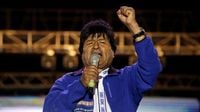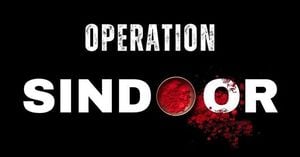On May 5, 2025, the Bolivian Police detained Judge Lilian Moreno in a dramatic turn of events that has sent shockwaves through the nation. Moreno, who recently annulled an arrest warrant against former President Evo Morales in a high-profile human trafficking case, is now facing serious accusations including prevarication and violations of constitutional resolutions.
The arrest occurred around 7:30 AM local time (11:00 GMT) in Santa Cruz, where Moreno was intercepted by police while leaving her home. A family member who accompanied her described the incident as brutal, stating, "The judge was brutally kidnapped; they pulled her out of the car without presenting any arrest order." This alarming account highlights the tense atmosphere surrounding the ongoing legal and political battles in Bolivia.
Following her detention, Moreno was transported to Viru Viru airport in Santa Cruz before being taken to La Paz. Her arrest comes just days after she issued a ruling that nullified the arrest warrant against Morales, who served as president from 2006 to 2019. This ruling also transferred the legal proceedings against Morales to the Trópico de Cochabamba, a region known for its strong support of the former president.
The implications of Moreno's ruling were met with immediate backlash. Romer Saucedo, the president of the Supreme Court of Justice (TSJ), publicly questioned her decision, while the Council of the Magistracy announced the initiation of an investigation into her actions. In a swift response, a new ruling was issued on Friday by Judge Franz Zabaleta, reinstating the arrest warrant against Morales, thereby intensifying the legal turmoil surrounding him.
Morales, who has been embroiled in controversy since an arrest warrant was issued against him in October 2024, is accused of having a child with a minor during his presidency. This serious allegation has led to significant unrest, with Morales' supporters blocking roads for 24 days to prevent his detention. The former president has remained largely confined to the Trópico de Cochabamba, protected by a loyal base of supporters.
Earlier this year, a Tarija court declared Morales in contempt after he failed to attend court hearings on two separate occasions, citing illness as his reason for absence. The Bolivian justice system has since prohibited him from leaving the country, frozen his bank accounts, and ordered a preventive annotation of his assets, all measures intended to ensure his compliance with the judicial process.
As the situation escalates, Morales has claimed that these legal actions are politically motivated, aimed at thwarting his candidacy in the upcoming national elections scheduled for August 17. After resigning from the Movimiento al Socialismo (MAS), the party he founded, Morales is seeking to return to the political arena, which he argues is being obstructed by the current government's legal maneuvers.
The backdrop to this legal drama is a complicated relationship between Morales and the current Bolivian president, Luis Arce. Their rift has been evident since late 2021, fueled by disputes over governance, control of the MAS, and the looming presidential elections.
In a separate but related judicial decision on the same day, the legal charges against Morales were formally dropped, nullifying both his indictment and the arrest warrant for human trafficking. Morales' lawyer, Jorge Pérez, expressed relief at the ruling, stating, "Justice was done," which allows Morales to move freely within and outside Bolivia without restrictions.
Despite the dismissal of the charges, Judge Moreno insists that the legal process against Morales should continue in Cochabamba, where he enjoys considerable support among local unions and farmers. The arrest warrant was initially issued by prosecutor Sandra Gutiérrez in December 2024, accusing Morales of failing to testify regarding allegations of aggravated human trafficking linked to a relationship with a minor under 15 years old in 2015.
The unfolding events in Bolivia highlight the intersection of law and politics, with Morales and his supporters framing the judicial actions as an attempt to undermine his political future. As the elections approach, the stakes continue to rise, and many are left wondering how this saga will ultimately unfold.
In a country already grappling with political divisions, the implications of these legal battles could reshape the landscape of Bolivian politics for years to come. With the presidential elections just around the corner, all eyes are on Morales, the judiciary, and the evolving narrative that continues to capture the public's attention.




